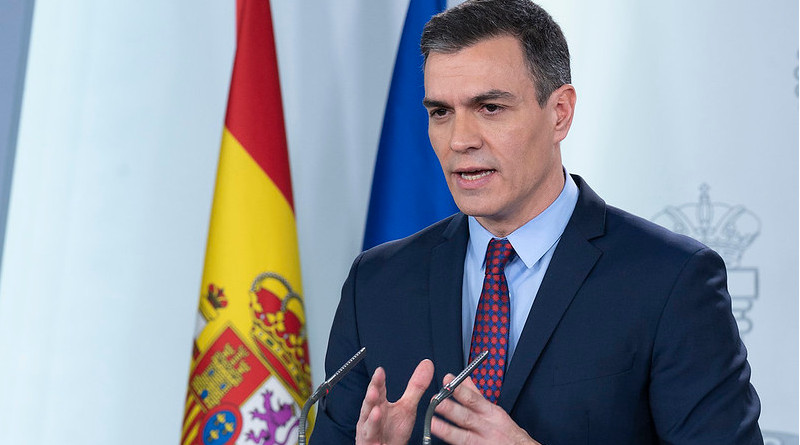Sánchez: Spain Must Ditch ‘Peripheral’ Role, Offer EU Leadership
By EurActiv
By Max Griera and Théo Bourgery-Gonse
(EurActiv) — It is high time Spain imposed itself as a leading EU country instead of staying “at the periphery,” Prime Minister Pedro Sánchez told the national employers association on Friday (15 September), as the Spanish EU Council presidency published a paper on the bloc’s ‘Open Strategic Autonomy’.
Fed up with its “peripheral” position in EU debates, Sánchez announced Madrid was ready to take centre stage and become a leading member state, joining the likes of France, Germany or Italy.
“For too many decades we have been satisfied as a peripheral country, a secondary actor in the negotiations in Brussels, following the positions set by other larger or more influential member states,” Sánchez said during the presentation of the paper to the association.
“We must put an end to this dynamic and we must exercise leadership in Europe from the South, a leadership that is undoubtedly inclusive, that listens to and respects the positions of the 27 member states.”
A Spanish official told Euractiv on condition of anonymity the general mood was that of “enough with being a young member state”.
“We were learning, we were adapting [and] following the leadership of larger member states. We now feel Spain has the maturity […] to have a more leading role in the future of the EU”.
“Inclusive” leadership
To this effect, the Spanish presidency published a non-paper titled ‘ResilientEU2030’, outlining what the bloc’s priorities should be for the next seven years and effectively staking its claim to shape policy in the years ahead.
The document, prepared in partnership with 80 different public bodies from all member states, sets out a “vision” for future EU policymaking “to guarantee the economic resilience and global leadership of the European Union in this decade”, Sánchez said.
This kind of blue-sky thinking, the Spanish official argued, is precisely what this new, “inclusive”, leadership is all about: “We created this project in which the 27 member states have been active […]. This is a kind of leadership that we feel we have to play”.
Spain should no longer be treated as “unequal,” he added, in a thinly veiled criticism of historically bigger and louder member states, but should instead be “a leader among equals”.
Such a move has apparently been positively received by other EU capitals.
“I can tell you that many member states were very happy with that, they were explicitly letting us know that they were very, very happy with Spain having this role in which we want to be a leader, but at the same time a very inclusive one, in which even the smaller member states are here and we consider them equally important,” the official added.
Beyond leadership signalling, however, the 81-page non-paper lacks concrete policy proposals.
It speaks of existing and future vulnerabilities the EU might be facing and acknowledges that the EU must “monitor foreign ownership,” “control strategic sectors,” and “launch a new trade expansion,” among others.
There are no proposals for how these could be tackled, however.
Spain chose “not to propose new policies because we feel that 2024 is not going to be a good year for this,” as European elections loom, the Spanish official explained.
Instead, it is all about setting a “strategic vision,” independent of concrete policy efforts Spain could undertake until the end of its Presidency rotation on 31 December.
Gaining momentum
Spain’s influence can already be felt in several aspects of EU policy-making.
In the European Parliament, it occupies a leading role in the biggest political group, the conservative European People’s Party (EPP), where it is the second biggest national delegation with 13 seats and occupies several chairmanships of parliamentary committees.
Meanwhile, the Parliament’s second largest group, the Socialists & Democrats (S&D) is chaired by Spaniard Iratxe García, and Spain’s socialist party PSOE is the largest within the group.
In the EU Council, as Spain is governed by a progressive coalition and holds the EU Council Presidency, the country’s vice president and Ecological Transition Minister Teresa Ribera have had a key role in brokering energy and green files.
And Spain might soon also get hold of the European Investment Bank’s leadership, as the bank’s current vice president, Economy Minister Nadia Calvino, is tipped as the leading candidate in the race for the EIB presidency, alongside her Danish counterpart Margrethe Vestager.

